

Sir Henry Howe Bemrose (19 November 1827 – 4 May 1911) was a British printer and publisher, as well as mayor and later Conservative Member of Parliament for Derby.


Sir Henry Howe Bemrose (19 November 1827 – 4 May 1911) was a British printer and publisher, as well as mayor and later Conservative Member of Parliament for Derby.
Bemrose was the first son of William Bemrose, and was educated at Derby School and King William's College, in the Isle of Man.
He and his brother William jnr became partners in his father's printing firm in Derby in 1858. He took over as chairman of the family firm of William Bemrose & Sons, printers of Derby and London and was a director of Parr's Derby Bank. He was active in many walks of public life, including the church and charitable organisations. After serving as Mayor of Derby in 1877–1878, he became Member of Parliament for Derby from 1895 to 1900. [1]
In 1855, he married Charlotte, daughter of William Brindley, of Derby. They had one son and five daughters. [2] The son, also named Henry (b. 1857), but known as Arnold, came into the family printing business in 1879. Henry senior was the grandfather of Sir Max Bemrose.
Henry Arnold rose to be Mayor of Derby and in 1910 he had the honour of awarding his father the Freedom of the Borough. A Derby porcelain commemorative cup recorded the event and it is now in Derby Museum and Art Gallery
After his death his library was bought after the money was raised from the public. The Library was extended to make room for this addition. [3] He left an estate worth about £90,000. [4]
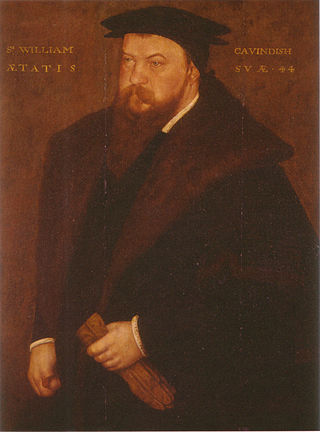
Sir William Cavendish MP was an English politician, knight and courtier. Cavendish held public office and accumulated a considerable fortune, and became one of Thomas Cromwell's "visitors of the monasteries" during the dissolution of the monasteries. He was MP for Thirsk in 1547. In 1547 he married Bess of Hardwick, and the couple began the construction of Chatsworth House in 1552, a project which would not be completed until after his death. His second son William Cavendish (1552–1626) became the first Earl of Devonshire, purchasing his title from the impecunious King James I.

Earl of Derby is a title in the Peerage of England. The title was first adopted by Robert de Ferrers, 1st Earl of Derby, under a creation of 1139. It continued with the Ferrers family until the 6th Earl forfeited his property toward the end of the reign of Henry III and died in 1279. Most of the Ferrers property and the Derby title were then held by the family of Henry III. The title merged in the Crown upon Henry IV's accession to the throne in 1399.

Joseph Howe was a Nova Scotian journalist, politician, public servant, and poet. Howe is often ranked as one of Nova Scotia's most admired politicians and his considerable skills as a journalist and writer have made him a provincial legend.

Henry Hartley Fowler, 1st Viscount Wolverhampton, was a British solicitor and Liberal politician who sat in the House of Commons from 1880 until 1908 when he was raised to the peerage. A member of the Wesleyan Methodist Church, he was the first solicitor and the first Methodist to enter the Cabinet or to be raised to the peerage.

Richard William Penn Curzon-Howe, 1st Earl Howe, was a British peer and courtier.
Sir Ernest Ridley Debenham, 1st Baronet, was an English businessman. He was responsible for the considerable expansion of the family's retail and wholesale drapery firm between 1892 and 1927.
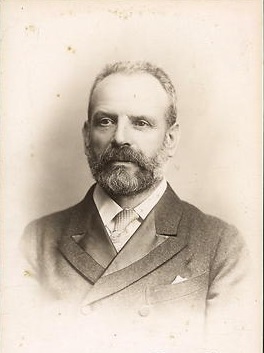
Thomas Roe, 1st Baron Roe, known as Sir Thomas Roe between 1894 and 1917, was a British businessman and Liberal politician, particularly associated with the town of Derby.
Sir John Maxwell Bemrose, known as Sir Max Bemrose, was an English industrialist, politician, and county officer for Derbyshire.
Bemrose may refer to:

John Vigor Brown, known as Vigor Brown, was a New Zealand Member of Parliament for Napier, in the North Island. He was Mayor of Napier for a total of 18 years. He was a well-known figure in his adopted city, a successful businessman, and involved in many clubs and organisations.
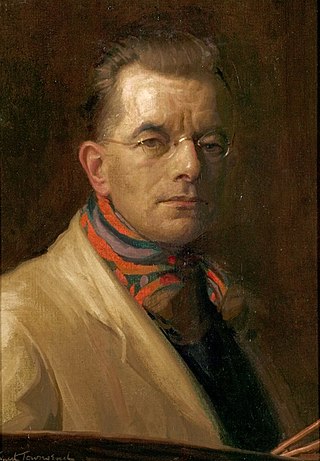
Ernest Townsend was a British portraitist from Derby.
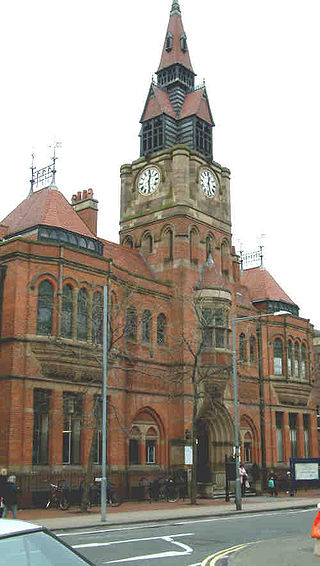
Derby Central Library was the main public and reference library in Derby, England, between 1879 and 2018. It was established in 1879 along with Derby Museum and Art Gallery, with which it shared a red brick building designed in the Domestic Flemish Gothic style by Richard Knill Freeman and given to Derby by Michael Thomas Bass. It was formerly the largest branch of Derby City Libraries run by Derby City Council.
Sir Robert Parkhurst was an English politician who sat in the House of Commons between 1625 and 1651. He supported the Parliamentary cause in the English Civil War.
William Bemrose (1831–1908) was a writer on wood-carving and pottery, director of a printing business and Royal Crown Derby. He wrote and published a biography of Joseph Wright of Derby.
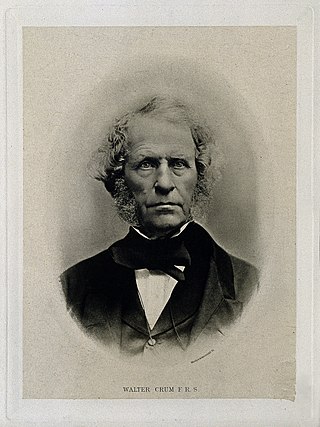
Walter Crum FRS (1796–1867) was a Scottish chemist and businessman. He became a Fellow of the Royal Society in 1844.

Reginald Corbet was a distinguished lawyer in four reigns across the mid-Tudor period, and prospered throughout, although he seems to have been firmly Protestant in sympathy. He was appointed serjeant-at-law and Justice of the King's Bench, and represented Much Wenlock in the parliament of 1542 and Shrewsbury in those of 1547, October 1553 and 1555. He enjoyed great wealth, partly because his wife was an heiress of Sir Rowland Hill, the first Protestant Lord Mayor of London.
The following is a timeline of the history of the city of Derby, England.
Dr Henry Howe Arnold Bemrose FGS was an English printer, publisher, and geologist.